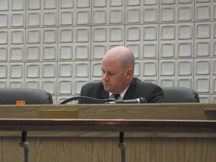Former City Business Administrator and Bayonne Parking Authority Attorney Peter Cresci lost round one of his lawsuit filed in September with the state Superior Court, a lawsuit that asked for his position as PBA attorney to be restored.
Superior Court Judge Bernadette DeCastro said Cresci “has failed to prove by clear and convincing evidence a legal right to support his claim.” Cresci had been trying to prove, in a motion filed in September as part of his earlier lawsuit against the BPA, that the BPA violated the Open Public Meetings Act by inadequately providing public notice of their Aug. 3 meeting at which he was terminated.
“The court finds that the BPA in the least complied with the technical requirements of the OPMA.” – Judge Bernadette DeCastro
________
In commenting on the ruling, Cresci said the only thing denied was his Order to Show Cause (which requested that the Judge immediately void the meeting of Aug. 3). He said the standard is high but that his complaint will continue.
“In the second week in Dec. 2009, the parties will meet with Judge DeCastro for a case management conference to set out a discovery schedule and briefing schedule,” he said. “The lawsuit will resume its regular track. The judge’s decision advises that I have not met the ‘imminent and irreparable harm’ standard and that the BPA provided facts different from the plaintiff’s fact. However, moving forward audio, video tape, and deposition testimony will demonstrate that violations of the Open Public Meetings Act did in fact occur at the Aug. 3, 2009 Special Meeting.”
Cresci filed his motion on Sept. 17 seeking reinstatement of his employment with the PBA, including back pay, benefits, and contributions. He also asked that the court void all actions taken at the special meeting on Aug. 3.
He had already filed a lawsuit in July against the BPA, charging them with what he believed were several improper actions.
City officials claim the recent ruling may pose a significant blow to Cresci’s suit against the BPA and the city, and the court has scheduled a conference between the parties for Dec. 11 to discuss what – if anything – remains of the original counts.
Cresci filed the original lawsuit in federal court on July 13, the same day that city officials, including Mayor Mark Smith, called for his resignation.
City got suspicious
A special investigator for the Parking Authority claimed in a report in August that Cresci had exceeded his authority as Parking Authority attorney. The investigator said Cresci did this by allegedly giving himself unauthorized raises and apparently working two full-time city jobs, one part time job, and billing the city for legal fees to defend the Parking Authority against a suit brought on by a former employee.
City officials said they looked more closely at Cresci’s activities after he was terminated as city business administrator in June, when he submitted a bill to the city for money allegedly still owed him.
Cresci’s suit claims that the Parking Authority has violated federal civil rights laws, some provisions under the federal Hatch Act, and the state’s Conscientious Employee Protection Act by allegedly coercing him into leaving his post as Parking Authority attorney.
At a special Sept. 24 meeting of the Bayonne Parking Authority, Nita Raval, an attorney hired to investigate allegations against Cresci, said her inquiries showed some apparent irregularities in operations while Cresci was employed at the Parking Authority.
Cresci had filed a lawsuit against the PBA while still employed there, before he was terminated. Raval said that by doing that, Cresci allegedly violated ethics rules and created a conflict of interest by doing so. Raval noted that some of the many allegations Cresci raised in his suit against the authority were issues he should have addressed as the BPA attorney. If the BPA was in violation of the Open Public Meetings Act at various meetings – one of Cresci’s allegations – then Cresci, Raval said, should have advised the board of the fact, Raval said.
In a motion subsequently filed by Cresci in September to have the court reverse the Parking Authority’s actions, Cresci said that the meeting on Aug. 3 was not properly publicized and that members of the BPA went into closed session twice during the meeting.
State statute, the court comments said, defines adequate notice as a written advance notice of at least 48 hours. In the case of a special meeting, the public body is required to post the announcement of the meeting in a prominent place.
The court noted that on July 29, Edward Florio, special counsel for the Parking Authority, sent the notice and agenda to two daily newspapers as well as the Parking Authority and the city clerk. The notice was published in one of the daily newspapers on July 31.
Cresci argued that the notice should have been published in the <>Bayonne Community News, which publishes every Wednesday and that the other newspaper, the daily Star Ledger, has no circulation in Bayonne.
The Parking Authority, however, said it complied with the law by notifying two designated newspapers.
“The court finds that the BPA in the least complied with the technical requirements of the OPMA in so far as giving notices to two newspapers within 48 hours of the Aug. 3 meeting,” Judge DeCastro wrote in her opinion.
The judge also said no record shows that the BPA conducted closed sessions during the Aug. 3 meeting, voiding Cresci’s other motion to reverse his firing.
City officials believe that these two issues were central to Cresci’s case. In losing them, the case will likely cease.
